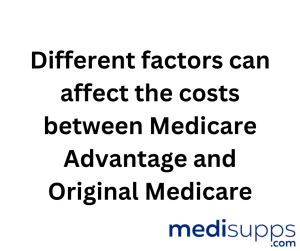
by Russell Noga | Updated September 24th, 2023
 Medicare Advantage plans have been gaining popularity, but are they really the best option for everyone? It’s essential to be aware of the potential drawbacks before signing up for a plan.
Medicare Advantage plans have been gaining popularity, but are they really the best option for everyone? It’s essential to be aware of the potential drawbacks before signing up for a plan.
In this enlightening article, we’ll explore the reasons why Medicare Advantage plans may not be the right choice for everyone and, specifically, why Medicare Advantage plans are bad for some individuals.
By the end of this article, you’ll have a better understanding of the limitations and potential pitfalls of Medicare Advantage plans.
We’ll also provide insights on how to assess your healthcare needs and navigate the enrollment process, ensuring you make the best decision for your unique situation.
So, let’s begin our journey by first uncovering the limitations of provider networks in Medicare Advantage plans and their impact on access to healthcare providers, which is one of the reasons why Medicare Advantage plans are bad for certain people.
Short Summary
- Review coverage and compare options during open enrollment due to limited provider networks, high out-of-pocket expenses, and potential changes in benefits.
- Evaluate individual healthcare requirements & financial situation for informed decision-making on Medicare Advantage vs. Original Medicare.
- Consider the Open Enrollment Period when choosing between the two plans & seek assistance from experienced, independent agents such as us here at Medisupps.com
Limited Provider Networks
One of the major disadvantages of Medicare Advantage is the restricted provider networks within most Medicare Advantage plans, which limit access to healthcare providers, such as doctors and hospitals.
This disadvantage arises due to incentives for providers to offer cost-effective care, potentially leading to lower quality care or fewer treatment alternatives, increasing healthcare costs for beneficiaries. Some might even consider these Medicare Advantage plans bad for this reason.
Navigating through these limited provider networks may be more challenging than expected. Obtaining a referral to an appropriate specialist or primary care physician could become a daunting task. In some instances, one may even have to travel a considerable distance to visit a provider within their network, adding inconvenience and frustration to the process.
To avoid unexpected costs and interruptions in care, it’s crucial to review Medicare coverage and compare options during the open enrollment period annually.
This ensures that any changes to plans are fully considered, and you can make an informed decision about whether a Medicare Advantage plan is still the best option for your needs.
Discover 2024 Plans & Rates
Enter Zip Code
High Out-of-Pocket Expenses
Another concerning aspect of Medicare Advantage plans is the high out-of-pocket expenses, such as deductibles, copayments, and prescription drugs. These costs can make Medicare Advantage plans more expensive than Original Medicare, leaving many beneficiaries struggling to afford their healthcare.
For those on a fixed income, these costs can be a significant burden. It is important.
Comparing Costs with Original Medicare
It’s essential to compare costs between Medicare Advantage and Original Medicare to determine the best option for your healthcare needs. For instance, a beneficiary may incur higher costs for a five-day hospital stay under Medicare Advantage than Original Medicare due to policy deductibles and copays applied from the first day of hospitalization.
Ultimately, the health of the Medicare beneficiary and their utilization of health care services are the primary determinants of their costs, as supported by research from the Kaiser Family Foundation.
Geographic Coverage Limitations
Medicare Advantage plans may not be the best choice for seniors who travel frequently or have residences in different states. These plans often have restricted geographic coverage, making them less suitable for those who are often on the move.
The limited coverage does not accompany beneficiaries while traveling, potentially leaving them without access to care when they need it the most.
This restricted network availability can also affect prescription drug coverage, potentially causing disruptions in medication access while away from home. In such cases, Original Medicare might be a better choice as it provides nationwide coverage without any geographic restrictions.
 Prior Authorization Requirements
Prior Authorization Requirements
Medicare Advantage plans often require pre-approval for certain medical services and prescription drug medications. This approval must be obtained from a health provider.
This prior authorization process can be laborious and delay the provision of care, causing frustration for both physicians and patients. Without the necessary prior authorization, the service may not be covered, leaving beneficiaries with unexpected out-of-pocket expenses.
Original Medicare, on the other hand, typically doesn’t require prior authorization, allowing for smoother access to care without the added stress of obtaining approvals.
Annual Benefit Changes
Annual changes to Medicare Advantage plan benefits can create uncertainty for policyholders. These modifications may restrict access to essential care and increase out-of-pocket costs if not thoroughly examined.
The atmosphere of insecurity and potential cost increases can be worrisome for beneficiaries who rely on consistent coverage for their healthcare needs.
It’s vital for patients to review their plan details each year and consider any increases in copays or deductibles that may affect their ability to afford necessary care and adhere to treatment plans. If the changes are not beneficial for their health needs or budget, patients should explore alternative options during the open enrollment period.
 Difficulty in Switching Back to a Medigap Plan
Difficulty in Switching Back to a Medigap Plan
Switching back to a Medigap plan from a Medicare Advantage plan can be a complex and challenging process. There is only a certain time each year you can apply to switch, and in many cases, you will need to go through medical underwriting when applying for a Medigap policy. This means they can deny you coverage based on your current medical conditions.
The potential loss of Medigap coverage is a significant concern for those considering switching back to Original Medicare.
Hidden Costs and Misconceptions
Medicare Advantage plans may come with hidden costs, such as copays, deductibles, and out-of-pocket expenses, which can lead to unexpected expenses and dissatisfaction.
Misconceptions about Medicare Advantage plans can further exacerbate the issue. For example, some people believe that these plans are always more expensive than Original Medicare or that all plans are identical.
These hidden costs and misconceptions can result in unforeseen outlays and discontent for beneficiaries. To avoid falling into this trap, it’s crucial to carefully evaluate your healthcare priorities and consider all available options before enrolling in a Medicare Advantage plan.
Impact on Quality of Care
Medicare Advantage plans may impact the quality of care due to their financial structures and provider limitations. Physicians have expressed concerns about limited provider networks, prior authorization requirements, and financial incentives that could potentially affect the quality of care provided.
Critics argue that the financial incentives of global risk may encourage providers and health plans to be parsimonious with healthcare, such as declining to pay for certain health screenings or prolonged nursing home stays not mandated by Medicare to reduce costs.
This could potentially compromise the quality of care received by beneficiaries enrolled in Medicare Advantage plans.
Assessing Your Healthcare Needs
When deciding between Medicare Advantage and Original Medicare, it’s crucial to assess your healthcare needs and preferences. Healthy beneficiaries who do not require frequent health care services may find Medicare Advantage plans to be the most suitable option.
These plans typically cover less out-of-pocket expenses associated with doctor visits and hospital stays. However, chronically ill beneficiaries may not benefit from Medicare Advantage plans due to the potential limitations in provider networks and coverage.
To make an informed decision, consider your individual healthcare requirements and financial situation. Weigh the pros and cons of each option and evaluate the availability of healthcare providers within the plan’s network.
By doing so, you can ensure that you receive the optimal care and coverage for your unique needs.
Medicare Advantage vs. Medicare Supplement
When comparing Medicare Advantage and Medicare Supplement plans, it’s essential to understand the key differences between them. Medicare Advantage is a distinct plan that combines your coverage, while Medicare Supplement Insurance plans are supplementary plans only accessible to beneficiaries in the Original Medicare program.
Carefully evaluating your priorities before enrolling in a Medicare Advantage plan can help you make an informed decision about your healthcare coverage. If you decide to enroll in a Medicare Supplement plan, be aware that the 6-month Medigap Open Enrollment Period is your only opportunity to enroll without answering health questions.
Failing to take advantage of the Medicare Supplement Open Enrollment Period may result in rejection due to pre-existing conditions or limited coverage options, unless you are within the first 12 months of trying a Medicare Advantage plan for the first time.
Compare Medicare Plans & Rates in Your Area
 Navigating the Enrollment Process
Navigating the Enrollment Process
Navigating the enrollment process for Medicare Advantage plans requires research and careful consideration of all available options. The initial step in the process is to contact Medicare.
The Open Enrollment Period for Medicare Advantage plans is annually from October 15th to December 7th, providing a window to explore and compare plans.
By thoroughly researching your options, you can ensure that you select the best plan for your healthcare needs.
Summary
Throughout this article, we’ve explored the various reasons why Medicare Advantage plans may not be suitable for everyone in 2024 and beyond. From limited provider networks and high out-of-pocket expenses to geographic coverage limitations and the possible need for prior authorization for certain services, it’s essential to weigh the pros and cons of these plans before making a decision.
Assessing your healthcare needs, comparing costs with Original Medicare, and understanding the enrollment process are critical steps in determining the best option for your healthcare coverage.
By carefully considering all available options and evaluating your unique needs, you can make an informed decision and ensure that you receive the optimal care and coverage for your situation.
In conclusion, it’s crucial to remain vigilant and well-informed when choosing between Medicare Advantage and Original Medicare. Your healthcare is of utmost importance, and making the right decision can significantly impact your quality of life.
Compare 2024 Plans & Rates
Enter Zip Code
Frequently Asked Questions
What are Medicare Advantage Plans, and why might they be considered unfavorable in 2024?
Medicare Advantage Plans are private health insurance alternatives to Original Medicare. Some individuals may find them unfavorable in 2024 due to specific limitations or costs associated with these plans.
Are there concerns about restricted provider networks within Medicare Advantage Plans in 2024?
Yes, one common concern is that some Medicare Advantage Plans may have limited networks of healthcare providers, potentially restricting beneficiaries’ choices when seeking care.
How might changes in Medicare Advantage plan coverage and costs affect beneficiaries in 2024?
Changes in coverage and costs can occur annually with Medicare Advantage Plans, impacting beneficiaries who may need specific medical services or prescription drugs.
Are there concerns about out-of-pocket costs and co-pays associated with Medicare Advantage Plans?
Yes, out-of-pocket costs and co-pays can vary among different Medicare Advantage Plans and may increase, potentially causing financial strain for beneficiaries.
What is the risk of beneficiaries not fully understanding the rules and limitations of their Medicare Advantage Plans?
Lack of awareness and understanding of plan rules and limitations can lead to unexpected healthcare costs and limitations in accessing care. It’s important to do thorough research prior to enrolling in a plan.
Are there any potential changes in the Medicare Advantage Plan landscape, such as plan availability, in 2024?
The availability of specific plans can change annually, and some beneficiaries may find that their preferred plan is no longer offered in their area in 2024.
Are there potential issues with changes in prescription drug formularies and coverage tiers within Medicare Advantage Plans in 2024?
Yes, changes in prescription drug formularies and coverage tiers can impact beneficiaries who rely on specific medications, potentially leading to higher costs or the need to switch medications.
How can beneficiaries make informed decisions about Medicare Advantage Plans despite potential drawbacks?
Beneficiaries can make informed decisions by thoroughly reviewing plan materials, comparing available plans, consulting with healthcare professionals, and considering their specific healthcare needs and preferences.
Find the Right Medicare Plan for You
Searching for the right Medicare plan doesn’t have to be confusing. Whether it’s a Medigap plan or you have questions about Medicare Advantage or Medicare Part D, we can help.
Call today at 1-888-891-0229 and one of our knowledgeable, licensed insurance agents will be happy to assist you!

Russell Noga is the CEO and Medicare editor of Medisupps.com. His 15 years of experience in the Medicare insurance market includes being a licensed Medicare insurance broker in all 50 states. He is frequently featured as a featured as a keynote Medicare event speaker, has authored hundreds of Medicare content pages, and hosts the very popular Medisupps.com Medicare Youtube channel. His expertise includes Medicare, Medigap insurance, Medicare Advantage plans, and Medicare Part D.


